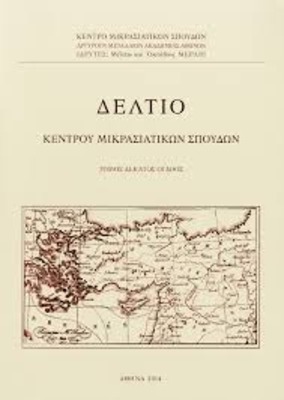Μιχαήλ Ι. Μουσαίος : Ο γάμος του Μαλώνη Αντιφάτου
Part of : Δελτίο Κέντρου Μικρασιατικών Σπουδών ; Vol.5, 1984, pages 275-359
Issue:
Pages:
275-359
Parallel Title:
Michail Mousaios : The marriage of Malonis Antifatis
Section Title:
Articles
Author:
Abstract:
The drama The marriage of Malonis Antifatis (more exactly the firstact of the theatrical work), is the only example of theatrical art from theregion of Lycia (Livisi) on the southeast Aegean coast of Asia Minor. Itis written in the local Greek dialect; its author is Michail I. Mousaios(1829-1896), one of the outstanding local scholars of the 19th century inthat area, who is a characteristic representative of the «delayed enlightenment» of the Greek orthodox population of Asia Minor. His primarymotive in the composition of the play was his belief that the purity of thespoken language offered unmistakable evidence of purity of the culturalorigins. So the goal of one of his works, Battarismoi, a vocabulary of theGreek dialect of the region in the form of a lexicon, is firstly to describethe alienation and decadence of the spoken language in his homeland, andsecondly to «improve» it, that is to purify the Greek and to eliminate theTurkish words which were in common use.The same goal is served by the theatrical work The marriage of MalonisAntifatis which plays in 1823, two years after the outbreak of theGreek revolution, and reenacts all the phases and activities of a tradi-donai engagement as well as the negotiations preparing the marriage. Butthe author’s interest is not a folkloristic one. It is, as he explains in theintroduction, first a linguistic one, and secondly it aims at the culturalenlightenment of his compatriots. His intention is to give them an initialstimulus to purify their language and habits. The drama is characterisedby an anticlerical attitude: the Orthodox priests and the great landowners(Kocabasi) try to stop any attempt at enlightenment and progress andthey are responsible for the «Asiatic» decadence of the community. TheTurkish words, sentences and proverbs in the text have not only thefunction of giving a sense of couleur locale, but they show expressivelythe decadence of language, culture and institutions. These are the ideologicalhighlights of the drama, which the main figure, Prokopios, putsforeward in extended soliloquies.The drama was not written to be played on the stage. But it does notlack theatrical qualities: the dialogue between the father and mother ofMalonis Antifatis is quick and vivid with stimulating turns, giving an interestinginsight into folk mentality and strategies of match-making. Butwhen Prokopios enters the stage, the style becomes more didactic, in amanner of giving lessons at school. Prokopios, who often addresses thepublic directly, uses the Greek «katharevousa», the purified language ofscholars and literateurs in the 19th century. He, as «hieromonachos», isthe idealised model of correcting language and manners as Mousaios putsit.This unique drama from the Lycian province is an important culturaldocument of Asia Minor both for its content — language, habits and manners,customs, mental structures, ways of life— and for what it symbolizes—the effort at enlightenment in the second half of the 19th century(when enlightenment in Greece was «démodé» for some decades). Theplay is a didactic manifesto against uncultivated conservatism, ignorance,and provincial backwardness, as these things are institutionalised in theclass of priests and landowners. The Marriage of Antifatis is an importantliterary and ideological document in the history of Greek literatureand, last but not least, a theatrical monument from an area without theatrical tradition.
Subject:
Subject (LC):




